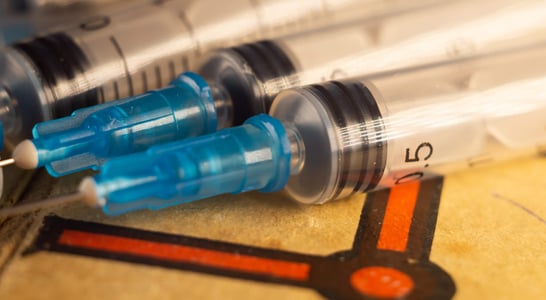
National Immunization Awareness Month
Guarding against preventable diseases, this medical shield protects lives, safeguards communities, and honors the value of health and well-being.
The US Center for Disease Control (CDC) indicates that thousands of Americans become ill each year with diseases that a vaccine can prevent. From the flu to the measles to Hepatitis, the process of immunization allows people to remain safe even when they are exposed to scary, sometimes even deadly, viruses and diseases.
Folks who are particularly at risk of infection, for instance those with COPD or asthma, are especially in need of protection. Immunizations offer the ability for society to fight against diseases through prevention and protection.
History of National Immunization Awareness Month
Getting its start in the United States when it was founded by the National Public Health Information Coalition, National Immunization Awareness Month (NIAM) is meant to highlight the important role that vaccines play for people of all ages. This event was first recognized in 2013 and has since been coordinated by the CDC.
The hope is that National Immunization Awareness Month will act as a time to raise awareness for and combat misinformation surrounding the way that vaccines work to maintain health not only for individuals, but also for local communities and, ideally, the population of the entire globe.
National Immunization Awareness Month Timeline
1796
Smallpox immunization study
By using arm-to-arm inoculation, English physician and scientist Edward Jenner’s method works on smallpox. [1]
1880
Louis Pasteur’s work leads to immunization
This French scientist who promoted germ theory studies the effects of cholera immunization on chickens. [2]
1952
Polio vaccine is developed
A major cause of disability in children, polio will become almost completely eradicated after the vaccine is invented by Dr. Jonas Salk and his team in Philadelphia. [3]
1972
Smallpox vaccine no longer needed
Because this immunization had been such a rousing success, smallpox is considered eradicated and vaccines no longer needed.[4]
2020
Vaccine for COVID-19 is developed
Just one year after the outbreak of the pandemic, the first vaccines for the disease are administered. [5]
How to Celebrate National Immunization Awareness Month
Join in and participate with National Immunization Awareness Month by getting involved in some of these ways:
Check Which Vaccines Are Needed
For people who have not recently been to a doctor or medical clinic, there may be some confusion about which immunizations are important for children or adults to have. Sometimes memories fail or medical records get lost, so it is vital to check with a medical professional to make sure that the necessary vaccines are up to date.
Those who don’t yet have an appointment with a doctor but want to stay informed can head over to the CDC website to use an interactive assessment tool that helps determine which vaccines are needed for adults or children. Celebrate National Immunization Awareness Month by visiting the website and getting more information.
Learn Facts About Immunization
Those who receive vaccines have a sort of superpower against all sorts of illness and disease. Being armed with information is also important when it comes to celebrating National Immunization Awareness Month! Check out some of these important facts related to vaccines:
-
Vaccines do not cause autism or Sudden Infant Death Syndrome
Although it is possible for a person to have some rare side effects from an injection, people are much more likely to be harmed by a preventable disease than by a vaccine.
-
Herd immunity will protect people
While this is true if a large percentage of the population is vaccinated, this is meant to protect at-risk people like infants, pregnant women or immunocompromised people, it won’t work if other people stop getting immunized.
-
A child can’t get the disease from the vaccine
Most vaccines are made from killed germs, which makes it impossible to get the disease from the vaccine.
National Immunization Awareness Month FAQs
Are immunizations and vaccines the same?
Technically, the vaccine is the actual injection or oral dose while the immunization is the process of becoming immune to disease following the vaccine. [1]
Do immunizations hurt?
An injection immunization may cause minor pain in the injection site for a few minutes, or soreness for a few days. [2]
Does immunization cause hair loss?
While alopecia (hair loss) can be a side effect of some medicines, vaccines do not typically have this side effect. [3]
How do immunizations work?
Immunization works by exposing a person to a small amount of a germ (whether live or dead) so the immune system can react to fight it off and then recognize the same germ if exposed in the future. [4]
Is there a vaccine for monkeypox?
Yes. Now called Mpox, the vaccine for this disease was originally developed to work against smallpox. [5]
Also in ...
View all holidaysNational Mountain Climbing Day
Scaling heights, conquering challenges, the crisp air, and breathtaking vistas—a symphony of nature's grandeur unfolds in ascent.
International Beer Day
Sharing laughs with friends over a refreshing, bubbly, golden pint is a classic recipe for good times and memorable moments.
National Spider-Man Day
Swinging between skyscrapers, stopping villains, and saving lives, this web-slinging hero never fails to amaze!
World Wide Web Day
Connecting us all, this virtual space where we share, learn, and create has revolutionized our world. The possibilities are endless!
We think you may also like...
National Healthy Skin Month
Preserving skin health ensures longevity, radiance, and shields against environmental stressors for a healthy complexion.
MedicAlert Awareness Month
Wearable lifesavers, providing crucial medical information, ensuring prompt care and potentially saving lives during emergencies.








